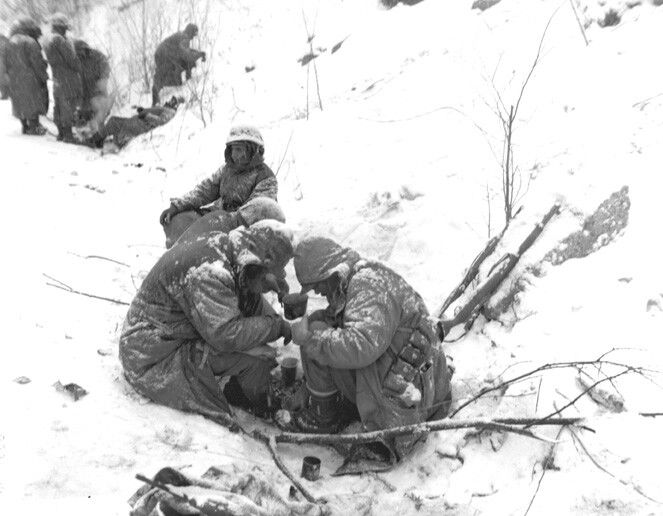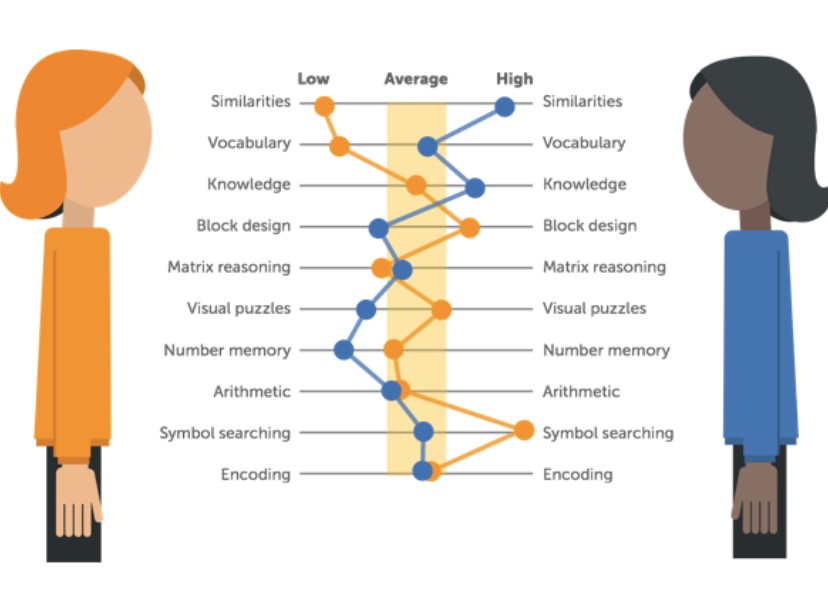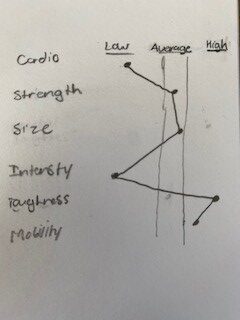Weekend Challenge #51: Trust in the Foxhole
1950. Chosin Reservoir, North Korea. Young American soldiers and Marines huddled in the dirt, near overrun by Chinese armies. The darkness pierces as flashes of enemy gear and bullets rush at them. The enemy’s lightning movement in stark contrast to the frozen terrain. Breath hanging for minutes in the -36° air. Firing pins too cold to strike hard enough and send a round downrange.[i]
For fourteen days and nights, American troops sat frozen as the enemy attacked. No way out. No chance of reinforcement. All they had was one another. The men lying next to them in the foxhole trading time in the bottom where the slightest warmth could be found with time on the top peering into the darkness. Shaking each other awake after only a few minutes to avoid frostbite while they slept. All they had was the man next to them. All they had, was the hope brought by another person surviving the same situation they were. All they had was trust in the foxhole.

Do you have foxhole trust with friends in your life?
Although you and your friends will likely never face anything such as Chosin, the lessons learned there shine light upon what it means to build real trust.
In his book, Think Like a Monk, Jay Shetty, outlined “4 C’s” of trust.[ii] See if you can catch how they might have been at play in the foxholes of Chosin:
Competence. When someone is competent, their opinions and recommendations can be trusted. They do their job and fill their role.
Care. We can trust people who we know care about us and have our best interests in mind.
Character. Those with a strong moral compass and uncompromising values earn our trust because we can rely on them for wisdom and guidance.
Consistency. Those we trust are reliable, present, and available when we need them.
It’s not a leap to see each of the 4 C’s at Chosin. Those soldiers had to be confident in each man’s ability to do their job and keep everyone alive. They cared for each other by sharing desperately low food rations and taking watch while others slept. They leaned on the uncompromising shared values of service and sacrifice. They were confident in each other to be there when temperatures dropped, the sunset, and the enemy was on the move.
The foxholes at Chosin can be tough to relate to but if we shift the enemy from the literal Chinese army to the metaphorical battles of life, we can start to see ourselves peeking over the edge. We need a foxhole built on trust when a family member passes, we lose a job, we move to a new city, we wave goodbye as our kids go to college, someone leaves a relationship, anxiety rises, depression sets in, a pandemic surges, a natural disaster strikes, or in the face of any other tribulation that comes our way.
If we are alone in our foxhole of LIFE, we are almost certain to be overrun by tragedy and loss. But if we turn around and see others in the foxhole with us, our resolve is strengthened.
It leaves us to question if we build the kind of trust necessary to fill the foxhole or if our adulthood and complacency strip us of some of the most important relationships of life. Loneliness, particularly in men, is rampant as I wrote in the very first piece for this blog, and our inability to build trust is a big player.
This is where the finger-pointing starts. We blame lost friendships on others. That old friend ditched you when they got married. Your college roommate got a job out of state and you never heard from them. When you moved, your friends seemed to forget about you. You ended a bad relationship that your friendships were tied to and no one took your side.
All of those are real possibilities but they rob you of ownership. You stopped reaching out. You pouted instead of making plans. You took it personally when someone had to cancel. You didn’t build your own network and relied on your old partner to do it for you. You let the friendships go and emptied your foxhole in the name of pride and being busy.
The problem is, we like ownership when it comes to workouts and waking up early. We don’t like it when it comes to our relationships and friendships. It’s easy to take what Jocko Willink says about extreme ownership and apply it to your alarm clock but his message is so much more.
If you don’t have foxhole friendships, you have to look at yourself first.
If you don’t have foxhole friendships, you have to look at yourself first.
You might be expecting me to give you answers at this point, so I hate to let you down. The truth is though, I write about things I struggle with so I’m working on how I build and maintain trust with my friends too. The best I can do is offer some questions that can jumpstart your ability to build trust and friendship:
- Competence
- What can I learn about that my friends are interested in?
- What needs are there in my friend group that I can be more aware of?
- Do I have the skills needed to be in the foxhole with my friends as they face challenges?
- Care
- How do I show my friends that I care about them?
- Do I really operate with my friend’s best interest in mind or do I bring selfishness to our interactions?
- Character
- Do I live the LIFE values as an example for my friends?
- In what circumstances do I compromise our values for my own betterment?
- Am I vulnerable in my journey to live with character or do I only present the strong moments to my friends?
- Consistency.
- Am I consistent enough?
- What are the inner conversations I have that hold me back from reaching out to friends?
- Am I secure enough in myself to answer when they call on me?
These questions can be tough to handle. I for one, know that I act selfishly in a lot of my friendships. I don’t want to admit it, but the truth is where I have to start.
The bottom line is that you need foxhole friendships to live LIFE to the full. The lone wolf sounds cool, but no lone wolf survives. It takes a pack. How will you build yourself into the person others want in the foxhole when the sun sets, temperatures drop, and the enemy is on the move?
Weekend Challenge
Two parts to really get into action on building yourself this weekend.
First, determine what your foxhole looks like. If we’re honest, a lot of us (especially men over 27 according to the research) look around our metaphorical foxhole and realize it’s empty. By being so focused on what is coming at us, we failed to build the trust that others need to be in the foxhole with us. We use excuses like being busy, prioritizing family, and having a career to justify our small number, and low-quality friendships but the truth is we simply don’t place the value on them that we should. We don’t admit that strong friendships would make us better family members, colleagues, and leaders. So, take stock of the foxhole. Who is with you? Would you also be in there’s?
Second, with those folks (or lack of) in mind. Ask yourself some of the questions above. Get some paper, write out the 4 C’s, and honestly evaluate yourself as a trust-builder. Find one of the 4 C’s that you might be able to improve upon to build more trust and then begin to act by making a call, checking in, buying a book, getting the LIFE Enacted Guide to align better with your values (yup, I did it!).
That’s it. I hope you have a great weekend. A weekend full of friendship, meaningfulness, and moving toward the person you want to be.
Best today. Better tomorrow.
[i] If you’re interested in Chosin, I read a really cool historical novel on the topic a few years back. It’s a big read but worth it if you’re into it. It’s called Frozen Hours by Jeff Shaara. Go check it out.
[ii] Shetty was inspired for his 4 C’s from the 3 C’s of trust put forward by a study on the Iraq War titled, “The 3 C’s of Trust: The Core Elements of Trust are Competence, Character, and Caring” authored by Michael D. Matthews and published in Psychology Today in 2016. (http://www.psychologytoday.com/us/blog/head-strong/201605/the-3-c-s-trust)
Weekend Challenge #51: Trust in the Foxhole Read More »











